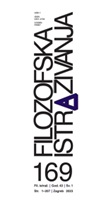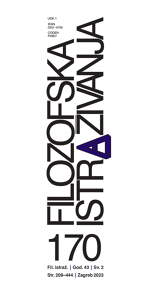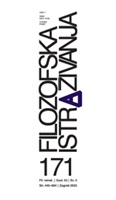Author(s): Milan Brdar / Language(s): Serbian
Issue: 4/2015
What does Heidegger’s discussion of authenticity of Dasein, as presented in Sein und Zeit (1927), contribute to the completion of his program of fundamental ontology (aiming at the sense of being as such)? Aiming to answer to this question the author examines the way authenticity is constructed. The author specifically emphasizes the fact that the authenticity is completed within what is given in „the One“ („das Man“), in the process by which Dasein realizes within its way of being his own specification or concretization. Furthermore Heidegger claims, on the one hand, that it is not possible to rank authenticity and inauthenticity as being something of “higher” and “lower” order, and, on the other hand, that the world has a transcendental status with primary role of the One (das Man). Therefore Dasein understands all from the world, builds its understanding by taking it from the world and constructing out of it its own specification. This has two important consequences: the first is the realization that authenticity has no significance for fundamental ontology, for the understanding of the Being that the Dasein has acquired is equally valuable whether it is authentic or not; and the second is that authenticity is of negligible significance, for the understanding that the Dasein has is obtained from the One, and because the world has a transcendental status, hence it is a priori as far as the understanding of all Being goes. Why then Heidegger deals with authenticity? Reason is to be found not in preparing work for fundamental onthology but in Heidegger’s anticartesianism. As he sketched the concept of Dasein in contrast to Descartes’ subject, he created a problem for himself. Just as Descartes had a problem with finding the way to bring the subject to the world, Heidegger is facing a problem: How can the Dasein, as something integrated into the world as beingin-the-world and being-with-Others, come to itself? Finding the answer to this question does not engage fundamental ontology, for it must be obtained as a precondition for creating the starting point for it. Finally, the author discusses a problem that emerges from this perspective: What is the source of Heidegger’s turn (Kehre)? Emphasized as reasons are Heidegger’s anthropocentrism and remnants of the subject-object relation. Anthropocentrism, however, was already overcomed in SuZ with the thesis about the trancendentalty of the world and by de-centering the subject given the primacy of understanding as contained in the One. As for the subject-object relation, it was overcome through the very discussion of authenticity on the basis of the thesis that the Dasein and the world are in original unity. It follows, then, that Heidegger did not offer the real reasons for his turn, hence the question remains: Why Heidegger did not remain satisfied with those results? That remains to be uncovered by further analyses of his philosophy!
More...



